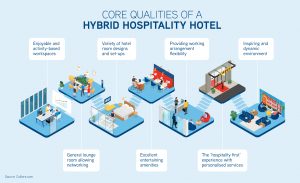Real estate strategy requires maximum flexibility in space without long-term obligations and high costs in design and fit-outs
While many office workers will continue to work from home more frequently and more regularly, the function of the workplace is fundamentally changing.
This means that occupiers must rethink their real estate strategy and rationalise their portfolio.
The benefits of flexible workplace are undeniable, and there are many different models available to tailor to the varying needs of a business. Could hotels also be part of the solution and meet some of those business needs? We see some great opportunities for hotels providing ‘hybrid hospitality’.
“If you want to be part of the success in the next evolution of the office, you should heed lessons learned in hotels the world over.”
Real estate strategy requires a learning from the hotel sector
The creation of a pleasant working environment is an integral element of the guest experience for workers in hotels. By listening to guest demands, staff become better equipped at meeting changing consumer needs.
In our view, if you want to be part of the success in the next evolution of the office, you should heed lessons learned in hotels the world over. Those lessons are plentiful – from accelerated shifts in workplace strategies which have led to more dynamic and hospitality-led spaces such as “meet and greet” areas, to espresso or cocktail bars within office spaces.
Specifically, there are plenty of unique opportunities for workplace providers who can swiftly respond to the changing demands of multi-cultural and multi-functional employees across Asia. Following the lead of sophisticated hoteliers aligning with the expertise of workplace strategists, the collaboration between flexible workplace and hotel operators is no doubt inviting – and also offers an interesting insight to the future of the office.
“This symbiotic relationship between offices and hotels has been developing for years, but the final push, as a result of work from home, has accelerated this trend.”
Flexible workspaces are doing an increasingly better job of rivalling the concept of the traditional office space, and hotel lobbies are increasingly serving as workspaces.
Walking into either the elaborate lounge of the Kerry Hotel in Hong Kong or the spacious Artyzen Habitat lobby in Hongqiao, Shanghai, you will find yourself wondering whether you are in a hotel or a cleverly designed office.
This symbiotic relationship between offices and hotels has been developing for years, but the final push as a result of work from home has accelerated this trend. At times when the scale tips in the direction of office working, flexible workspaces benefit. For many companies who are transitioning to a flexible working culture that mainly consists of working remotely – and there will be many – hotels can offer an interesting alternative.
The business model of flexible workspaces mainly consists of offering contracts based on a five-day working week. Providing subscriptions for one or two days a week is possible but financially unappealing, which is why it barely occurs in practice.
Hotels can fill this gap if they have enough room. For them, renting out workspaces contributes to the existing business model and maximises the use of their real estate with low risk. They are already specialised in reception, hospitality and additional guest services and often provide quality dining and drinks facilities.
Indeed, they are in most, already the meeting point with our clients and colleagues. Why not expand on this?
‘Hybrid Hospitality’ is the future
There are countless opportunities for hotels that provide ‘hybrid hospitality – in other words, workspaces (be it under-utilised meeting rooms or lobbies) with good services in an inspiring environment by day, and hotel rooms by night. This is a supplementary business model that aligns with the peak and off-peak rhythm of hotels.

The principle is to generate more by investing less. Those same spaces are used more intensively for various guests. However, hotels must be willing to adapt their spaces and their policy, because at this time many traditional hotels are still not suitable for this purpose.
“The added value of hybrid hospitality… Is that maximum flexibility in the organisation of workspaces and meeting spaces can be arranged, whilst ensuring the avoidance of high initial investments concerning the design and fit-out.”
Core qualities of a ‘hybrid hospitality’ hotel are:
- Pleasant workspaces such as closed-off focus rooms, meeting and event rooms, and dedicated co-working spaces (the old business centre)
- A general lounge room suitable for networking and socialising (socially distanced of course)
- Hotel rooms with the option of workspaces – not just a small desk in a dark corner of the room
- Excellent facilities such as accessible and on-site meeting rooms, restaurants and bars which are also suitable for small-scale events
- Providing daily flexibility for work and meetings
- A ‘hospitality-first’ experience with the personal touch and on-demand service that’s already trusted
- An inspiring and dynamic environment with local and international allure
The added value of hybrid hospitality for businesses and employees is that maximum flexibility in the organisation of workspaces and meeting spaces can be arranged without the need for long-term obligations and guarantees, whilst ensuring the avoidance of high initial investments concerning the design and fit-out. It also reduces business accommodation costs if only used for two to three working days a week, in addition to working from home.
Hybrid hospitality can also add value to the local community. The hotel has a mixed purpose, resulting in an improved connection between the city centre and the neighbourhood, rather than limiting services to tourists and business travellers from out of town.
Hotels, owners, the community and the environment can therefore benefit from hybrid hospitality – resulting in a win-win situation, which is an excellent real estate strategy.






